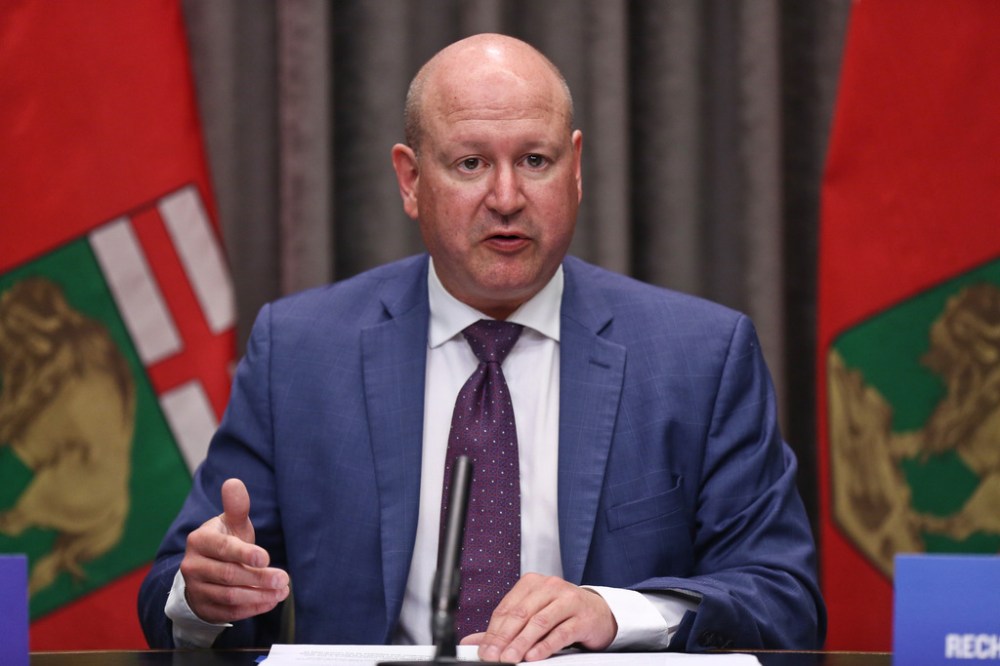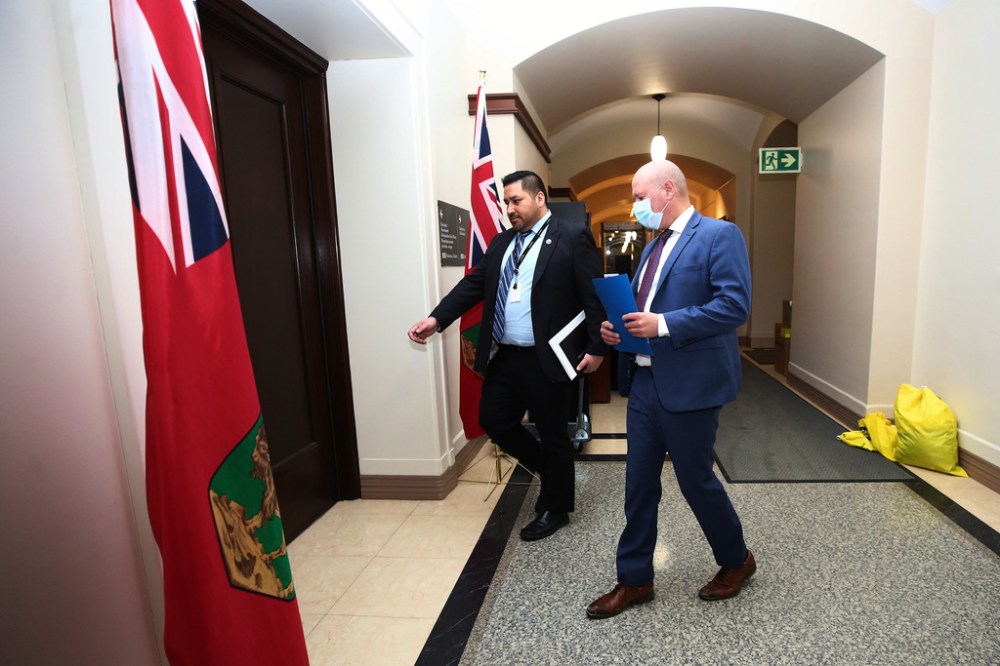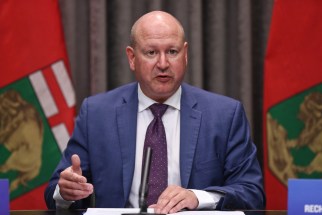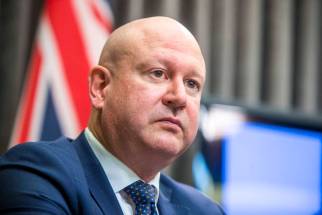No plans for COVID restrictions amid rising transmission Weekly updates are good enough for Manitobans, says Dr. Brent Roussin
Read this article for free:
or
Already have an account? Log in here »
To continue reading, please subscribe:
Monthly Digital Subscription
$1 per week for 24 weeks*
- Enjoy unlimited reading on winnipegfreepress.com
- Read the E-Edition, our digital replica newspaper
- Access News Break, our award-winning app
- Play interactive puzzles
*Billed as $4 plus GST every four weeks. Offer only available to new and qualified returning subscribers. Cancel any time.
Read unlimited articles for free today:
or
Already have an account? Log in here »
Hey there, time traveller!
This article was published 07/04/2022 (1054 days ago), so information in it may no longer be current.
Manitoba’s top doctor isn’t about to reimpose public health restrictions or report more COVID-19 data even though transmission of the virus and hospital admissions have increased.
“We think we’re at the right spot with our public health interventions,” Dr. Brent Roussin said at his first media briefing in three weeks.
Although test-positivity rates have gone up and wastewater surveillance is trending upward, he expects a “relative plateau” in hospitalizations and intensive care admissions to level off.

Manitoba’s chief public health officer said there is no plan to bring back an indoor mask mandate. He justified the curtailing of COVID-19 data reporting to weekly updates that have fewer details — such as how many patients with COVID-19 are hospitalized and how many are infected in personal care home outbreaks.
“The data right now is appropriate for where we are in the pandemic,” said Roussin. After two years, COVID-19 isn’t over and this is a “transition phase” toward it becoming endemic, he insisted.
Officials are keeping tabs on how many people are hospitalized with the coronavirus but aren’t reporting that data publicly, Roussin said.
“Some of that is skewed when you see dramatic transmission in the community. There’s a lot of incidental admissions to hospital because everyone admitted to hospital is being tested. Many of those admissions aren’t there because of COVID-19,” he said.
“They’re there, and test positive.”
The doctor, who has been the face of Manitoba’s pandemic response, said he’s had a third vaccine dose, he wears a mask in indoor public places and feels comfortable attending large public events where masks aren’t required. He has assessed his personal risk, but it’s not one size fits all, he said.
“Every individual has to make that decision based on their own status assessment.”
Vaccination is the most effective public health intervention, he said, as he repeatedly urged Manitobans who are eligible for a shot to get it.
“Right now, if you are due for a vaccination, you should get that vaccination as soon as you’re eligible,” he said.
About 80 per cent of eligible Manitobans have had two doses, while more than half of adults have had a third booster dose. For those over 50 years old, it’s 70 per cent.
The effort to get children aged five to 11 vaccinated “could use some work,” with about 41 per cent having received two doses so far, said Roussin.
Increased reporting on COVID-19 numbers in Manitoba won’t compel people to get vaccinated, he said.

“If I thought that daily reporting would do that, then we would have daily reporting or twice-daily reporting,” Roussin said. “We know our best tool is getting vaccinated.”
Critics said Manitobans can make better choices if they’re informed.
“The only way we’re going to understand and buy into what this government is asking people to do is by having access to that information,” said NDP health critic Uzoma Asagwara.
“This government seemingly overnight removed access to that information and is now picking and choosing what Manitobans can receive. It’s creating doubt.”
Liberal Leader Dougald Lamont questioned “who calls the shots” when it comes to making public health decisions.
“All the minister (of health) and premier say is they take advice from public health,” the member for St. Boniface said. “We’d like to know who is actually making these decisions.”
The now-weekly epidemiology report from Manitoba Public Health released Thursday said test-positivity rates increased to 18.6 per cent from 13.9 per cent last week. A total of 1,359 cases were detected between March 27 and April 2 (up 380 from the week prior).
The spike in infections is being fuelled by the highly contagious BA.2 variant of Omicron, which is now the dominant version of the coronavirus in Manitoba, said Roussin.
BA.2 makes up about 60 per cent of transmission in Manitoba.
Most of the Manitobans being hospitalized with COVID are 80 years and older, the doctor said.
Public health reported six new deaths due to COVID-19 in the past week, though the total COVID-19 death toll increased by seven to 1,751 since March 2020.
Seven outbreaks were declared at long-term care facilities. The public isn’t being informed about how many people are infected in each care home, but “the people affected are well aware of the magnitude of outbreaks,” Roussin said, noting public health officials are tracking that information.
A total of 141 people were admitted to hospital, including 11 to intensive care, in the past week. One week earlier, 111 people were admitted to hospital.
Roussin estimated that 20 of the patients in the ICU have COVID-19.
Absenteeism among Winnipeg Health Region staff has risen in the past six weeks but not necessarily because of COVID, Shared Health reported Thursday.
For the most recent two-week pay period ending April 6, sick time accounted for 58,300 hours lost per week. For March 23, 52,200 hours were lost per week. For March 9, 48,600 hours were lost per week.
To provide context, Shared Health said the equivalent of 760 additional eight-hour shifts were lost per week to sick time in this most recent pay period when compared to the previous cycle. Pre-pandemic, in 2019, the rate of absenteeism in Winnipeg was equivalent to 5.42 per cent of all worked hours, with the equivalent of about 39,100 hours lost per week.
During the pandemic, absenteeism peaked in the first pay period of January 2022 at 10.05 per cent.
— with files from Danielle DaSilva and Chris Kitching
carol.sanders@freepress.mb.ca

Carol Sanders
Legislature reporter
After 20 years of reporting on the growing diversity of people calling Manitoba home, Carol moved to the legislature bureau in early 2020.
Our newsroom depends on a growing audience of readers to power our journalism. If you are not a paid reader, please consider becoming a subscriber.
Our newsroom depends on its audience of readers to power our journalism. Thank you for your support.
History
Updated on Thursday, April 7, 2022 2:15 PM CDT: fixes typo in dek
Updated on Thursday, April 7, 2022 6:36 PM CDT: Updates with full write-thru, additional info, quotes, photos, formatting
Updated on Thursday, April 7, 2022 6:46 PM CDT: updates bg photo











